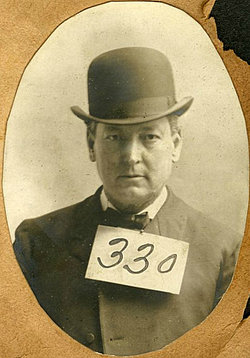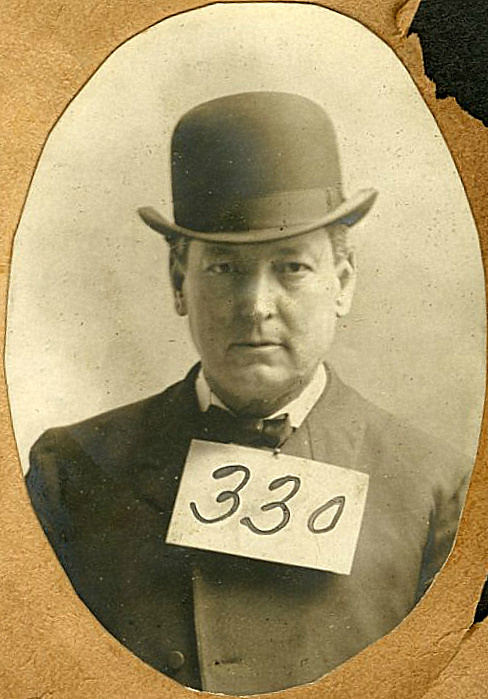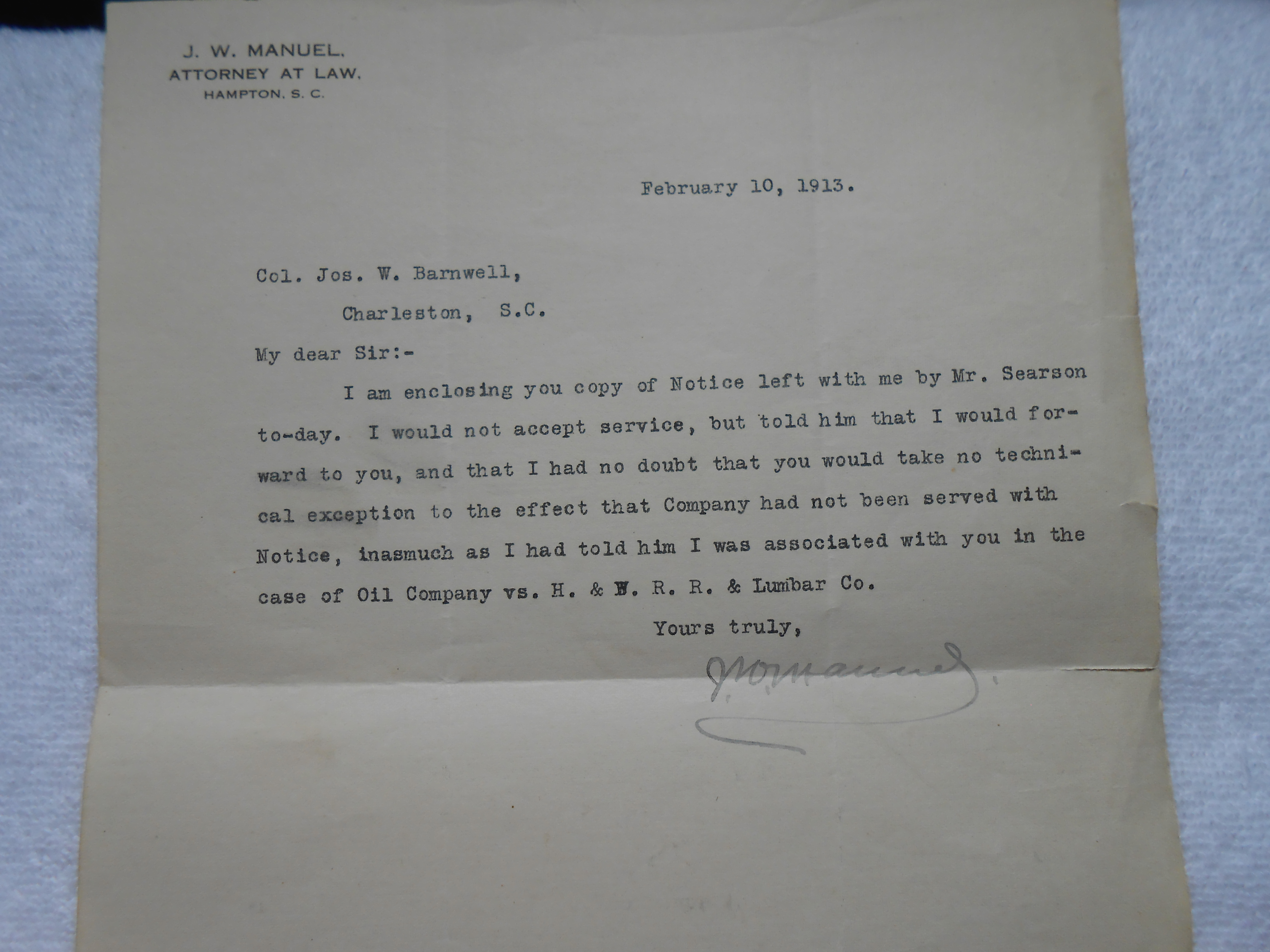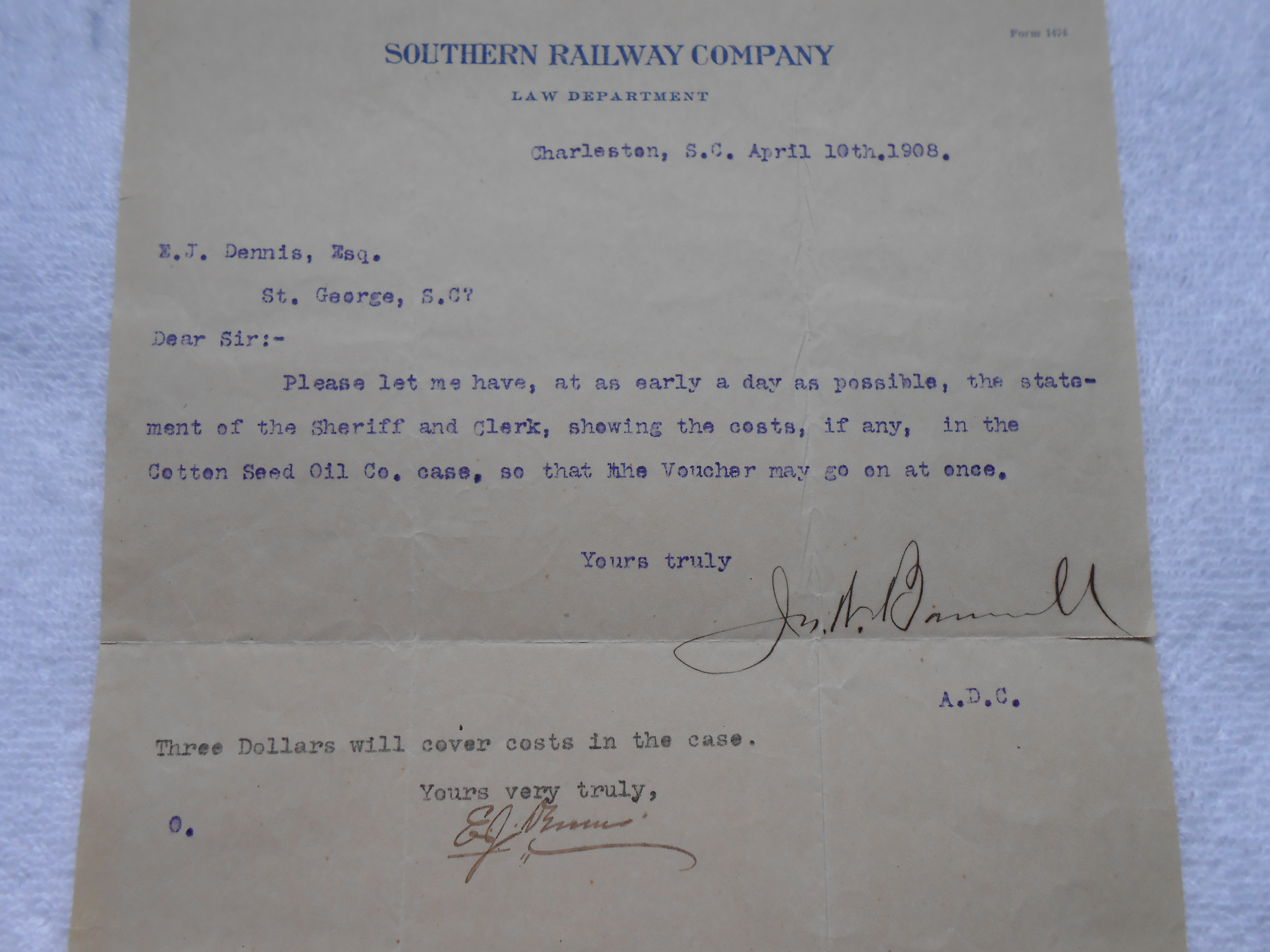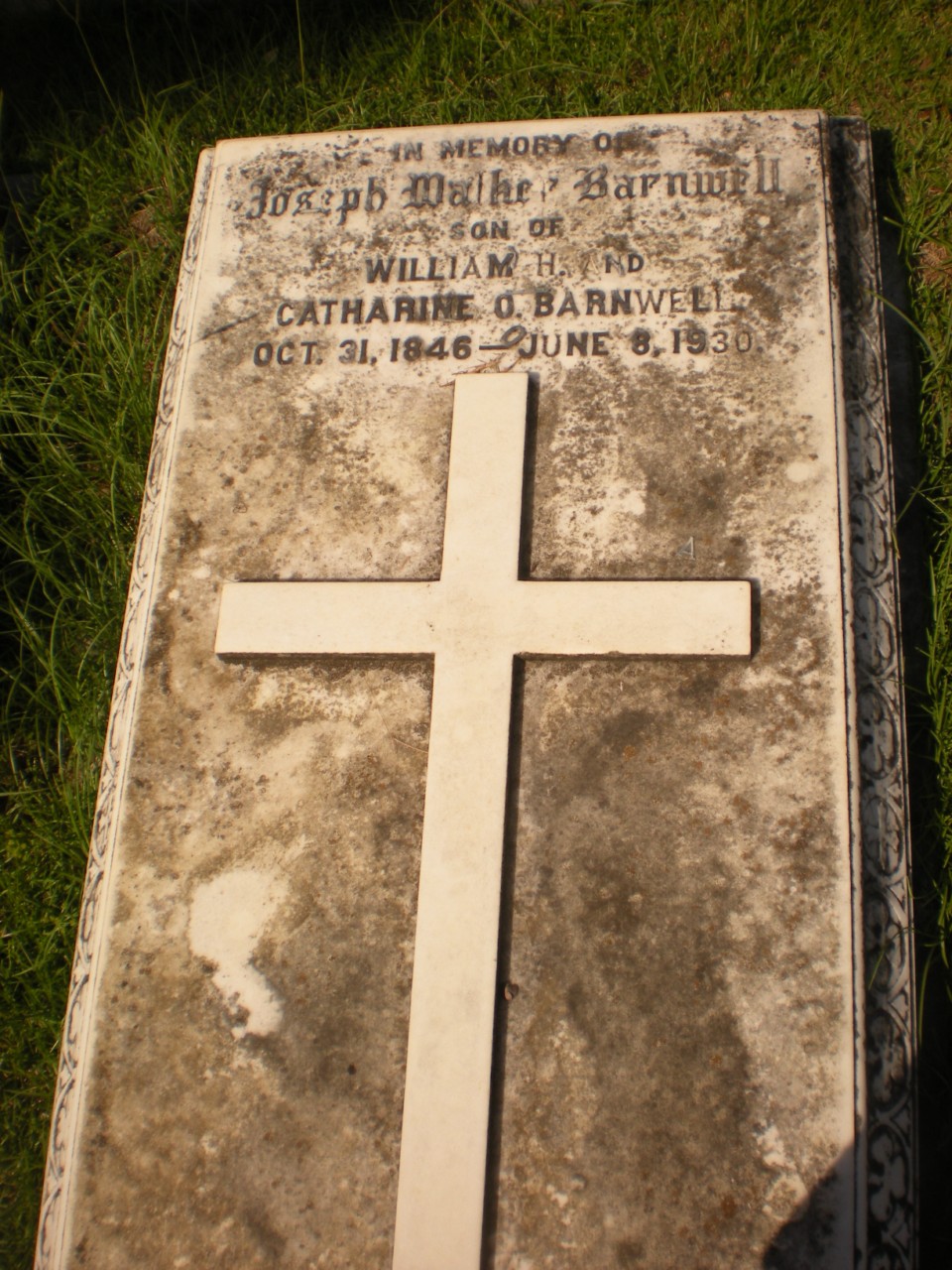Lawyer and legislator, was born in Charleston, South Carolina, October 31, 1846. His parents were William Hazzard and Catharine Osborn Barnwell. His father practiced law for a time and then became a clergyman of the Protestant Episcopal church. For twenty-one years he was rector of St. Peter's church in Charleston. He was a man of fine talents, high character, industrious, courageous, an eloquent preacher, and a public-spirited citizen. His wife (who was born a Barnwell) was a woman of excellent attainments and gentle and kindly disposition, whose influence upon her son was strong, helpful, and enduring. The earliest ancestor of the family to locate in this country was Colonel John Barnwell, who came from Dublin, Ireland, and settled in Charlestown (since 1783 spelled Charleston) in 1701. He commanded the expedition against the Tuscaroras in 1711, was colonel in the Yemassee war of 1715, and in 1719 was sent to England by the colony to negotiate its transfer to the crown. His son, Colonel Nathaniel Barnwell, was aide to General Oglethorpe in the expedition against St. Augustine in 1740. Robert Gibbes Barnwell, son of Colonel Nathaniel Barnwell, was speaker of the house of representatives and president of the senate of South Carolina. He was a delegate to the continental congress and a congressman in 1791, and a valiant soldier in the Revolution, in which war he received no less than seventeen wounds.
In childhood and youth Joseph W. Barnwell was healthy and strong. He was fond of books and of games of all kinds that were common in his locality. Until he was six years of age his home was in Charleston. During the next nine years he lived in Beaufort from May to November and passed the remainder of the year on his father's plantation on Broad river, Port Royal island, ten miles from Beaufort. He studied at Beaufort college, and the schools of B. R. Stuart and A. Sachtleben, both at Columbia, at the Citadel during the war, and later at the University of South Carolina. He also studied for a time at the University of Gottingen in Germany. Although he acquired a broad education, he never took a professional course. In order
to take these courses of study he was given by friends $2,500, but paid back the entire sum after he commenced professional work. From January 1, 1864, to December 7 of the same year he was at the South Carolina Military academy, and on the day last named he received a severe wound in an engagement near Tulafinni, South Carolina. From early boyhood he had felt that he was destined for the bar. He was admitted to practice in 1869, and in January, 1871, he commenced active work in his profession. His success was assured at the start. And he not only made his way as a lawyer, but his talents and energy brought him political honors. In November, 1874, he was elected a member of the state house of representatives from the Charleston district. In this capacity he served for two years, and with Honorable George A. Trenholm sustained the policy of Governor Chamberlain in his attempt to secure reform in the state government. At the close of the term he declined reelection. In 1890 he was a candidate for attorney general on the Haskell ticket, in which political contest Judge Alexander Cheves Haskell and Benjamin R. Tillman were opposing candidates for governor. In 1894 he was elected to the state senate, in which he served two years, when, owing to a change in the district, the office was abolished. In 1900 he again became a member of the state senate for a term of four years, at the expiration of which time he declined to be a candidate for reelection. For several years he served with ability and fidelity as chairman of the Democratic party in Charleston county. He has also been prominent in the social and literary life of Charleston. He has been president of the Charleston club and of the South Carolina Historical society, vice-president of the Charleston literary society and of the Carolina Art association, and chairman of the managers of the St. Cecilia society. In all of these positions he has won high commendation. Through these societies, and in various other ways, ho has done much to maintain and still further develop appreciation of art and literature and the higher pleasures and refinements of life in the cultured city in which he lives. Among his plans for the future is the bringing of McCrady's "History of South Carolina" down to date—a work which it is much to be hoped he will carry out. His reading has been wide and varied, including, as he says, "all kinds from the Bible down." He finds his relaxation in a month's holiday each year at Flat Bock, North Carolina, and in reading everything he can find time to read. In politics he has always been a Democrat. His religious affiliation is with the Protestant Episcopal church, in which he is deeply interested.
On January 23, 1883, Mr. Barnwell was married to Miss Harriott Kinloch Cheves, daughter of Dr. Charles M. Cheves and Isabella Middleton. Of their five children three are living in 1907.
His postoffice address is Number 48 South Battery, Charleston, South Carolina.
Lawyer and legislator, was born in Charleston, South Carolina, October 31, 1846. His parents were William Hazzard and Catharine Osborn Barnwell. His father practiced law for a time and then became a clergyman of the Protestant Episcopal church. For twenty-one years he was rector of St. Peter's church in Charleston. He was a man of fine talents, high character, industrious, courageous, an eloquent preacher, and a public-spirited citizen. His wife (who was born a Barnwell) was a woman of excellent attainments and gentle and kindly disposition, whose influence upon her son was strong, helpful, and enduring. The earliest ancestor of the family to locate in this country was Colonel John Barnwell, who came from Dublin, Ireland, and settled in Charlestown (since 1783 spelled Charleston) in 1701. He commanded the expedition against the Tuscaroras in 1711, was colonel in the Yemassee war of 1715, and in 1719 was sent to England by the colony to negotiate its transfer to the crown. His son, Colonel Nathaniel Barnwell, was aide to General Oglethorpe in the expedition against St. Augustine in 1740. Robert Gibbes Barnwell, son of Colonel Nathaniel Barnwell, was speaker of the house of representatives and president of the senate of South Carolina. He was a delegate to the continental congress and a congressman in 1791, and a valiant soldier in the Revolution, in which war he received no less than seventeen wounds.
In childhood and youth Joseph W. Barnwell was healthy and strong. He was fond of books and of games of all kinds that were common in his locality. Until he was six years of age his home was in Charleston. During the next nine years he lived in Beaufort from May to November and passed the remainder of the year on his father's plantation on Broad river, Port Royal island, ten miles from Beaufort. He studied at Beaufort college, and the schools of B. R. Stuart and A. Sachtleben, both at Columbia, at the Citadel during the war, and later at the University of South Carolina. He also studied for a time at the University of Gottingen in Germany. Although he acquired a broad education, he never took a professional course. In order
to take these courses of study he was given by friends $2,500, but paid back the entire sum after he commenced professional work. From January 1, 1864, to December 7 of the same year he was at the South Carolina Military academy, and on the day last named he received a severe wound in an engagement near Tulafinni, South Carolina. From early boyhood he had felt that he was destined for the bar. He was admitted to practice in 1869, and in January, 1871, he commenced active work in his profession. His success was assured at the start. And he not only made his way as a lawyer, but his talents and energy brought him political honors. In November, 1874, he was elected a member of the state house of representatives from the Charleston district. In this capacity he served for two years, and with Honorable George A. Trenholm sustained the policy of Governor Chamberlain in his attempt to secure reform in the state government. At the close of the term he declined reelection. In 1890 he was a candidate for attorney general on the Haskell ticket, in which political contest Judge Alexander Cheves Haskell and Benjamin R. Tillman were opposing candidates for governor. In 1894 he was elected to the state senate, in which he served two years, when, owing to a change in the district, the office was abolished. In 1900 he again became a member of the state senate for a term of four years, at the expiration of which time he declined to be a candidate for reelection. For several years he served with ability and fidelity as chairman of the Democratic party in Charleston county. He has also been prominent in the social and literary life of Charleston. He has been president of the Charleston club and of the South Carolina Historical society, vice-president of the Charleston literary society and of the Carolina Art association, and chairman of the managers of the St. Cecilia society. In all of these positions he has won high commendation. Through these societies, and in various other ways, ho has done much to maintain and still further develop appreciation of art and literature and the higher pleasures and refinements of life in the cultured city in which he lives. Among his plans for the future is the bringing of McCrady's "History of South Carolina" down to date—a work which it is much to be hoped he will carry out. His reading has been wide and varied, including, as he says, "all kinds from the Bible down." He finds his relaxation in a month's holiday each year at Flat Bock, North Carolina, and in reading everything he can find time to read. In politics he has always been a Democrat. His religious affiliation is with the Protestant Episcopal church, in which he is deeply interested.
On January 23, 1883, Mr. Barnwell was married to Miss Harriott Kinloch Cheves, daughter of Dr. Charles M. Cheves and Isabella Middleton. Of their five children three are living in 1907.
His postoffice address is Number 48 South Battery, Charleston, South Carolina.
Family Members
-
![]()
Rev Robert Woodward Barnwell
1831–1863
-
![]()
Edward H. Barnwell
1832–1908
-
![]()
Catherine Osborn Barnwell
1835–1920
-
![]()
Elizabeth Barnwell Barnwell
1837–1916
-
![]()
Esther Hutson Barnwell
1838–1925
-
Capt William Barnwell
1841–1861
-
![]()
Stephen Elliott Barnwell
1842–1923
-
![]()
Ann Barnwell Mazyck
1843–1915
-
![]()
Allard Belin Barnwell
1848–1899
-
![]()
Mary Elliott Barnwell
1850–1927
-
![]()
Charles Mathews Barnwell
1852–1923
Sponsored by Ancestry
Advertisement
Advertisement
